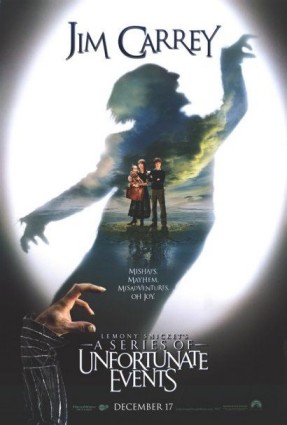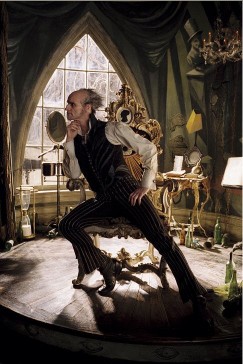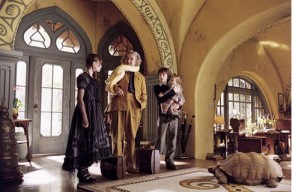Instead, we speak of Lemony Snicket's A Series of Unfortunate
Events, a film with a bold flavor. Director Brad Silberling
(the word Silberling here meaning the director of Casper
and husband of Judging Amy) and screenwriter Robert
Gordon have condensed, cut and generally reshaped the first
three books in Daniel Handler's series to mixed results.
Though the film moves along at a brisk clip, it also reveals
how episodic and, yes, though I can scarcely bring myself
to type the word though I must, repetitive the novels are.
The characters barely have time to register here, other
than the Baudelaire Orphans, whose story this is, and their
nemesis Count Olaf (Jim Carrey). Even using three books,
the plot plays out cyclically. The children meet a guardian
figure (other than Olaf) willing to love them and be kind,
even if they're quirky, and they shortly meet an ignominious
fate at the clutching hands of Olaf.
True, they're broadly written anyway, more caricature
than character in the first place. When Timothy Spall and
Cedric the Entertainer pop in and out of the story, it's
not jarring. But the children's guardians, Uncle Monty (Billy
Connolly) and Aunt Josephine (Meryl Streep) only start to
grab our attention before being cruelly, tragically ripped
away by the evil Count's nefarious machinations. What takes
a hundred pages in the books feels like only ten minutes
on screen. The word nefarious means this is, after all,
a star vehicle for Carrey.
Yet the protean actor does not overpower the story, as
he often has in other films. While Count Olaf is meant to
be a terrible over-actor, Carrey takes a far subtler path
than you might expect. In an early scene with his "acting
troupe," Olaf goes wild, but Silberling wisely allows only
brief glimpses, stolen glances as the Baudelaires ingeniously
throw a dinner together from Olaf's horror of a kitchen.
Perhaps the element that would scare fans the most is
the casting of the children. Have no fear, fans of Snicket,
for Emily Browning, Liam Aiken and the Hoffman twins capture
the tone of the characters perfectly. (I suspect, but can't
prove, that the presence of the Hoffman twins also accounts
for a surprising third act cameo.) Okay, so the baby is
a little too precocious; she is in the books, too. Her dialogue
has lost some of its wit in favor of out and out punchlines,
a word meaning broad jokes to please the masses.
And please the masses it might. Silberling has to walk
a fine line between the dark humor that children secretly
love and somehow trying to hide it from the adults who may
be shocked at just how macabre this story is. He and Gordon
also have to try and translate a much-beloved and idiosyncratic
sensibility to the screen, which for the most part, they
succeed in doing.
Their opening sequence, for instance, is brilliant, as
audiences accidentally stumble into a cheery animated film
called The Littlest Elf, a character later given
come-uppance in the real movie. Their reorganization of
the plot, with one brilliant scheme of Olaf's of their own
devising, also works very well to straddle the fine line
of giving closure while still allowing for a franchise.
The downside is that they also have to create a solution
to the central mystery that the books haven't quite reached
yet.
As you might guess, the production design also adds a
lot to it, owing as much to Charles Addams and Edward Gorey
as to the original illustrations of the book. Here again,
the casting of Carrey is almost eerie, because there are
moments when he looks like he could have stepped right out
Brett Helquist's inkwell.
So Lemony Snicket's A Series Of Unfortunate Events
does not make a bad beginning after all. But only the box
office will tell if the series will go on.








